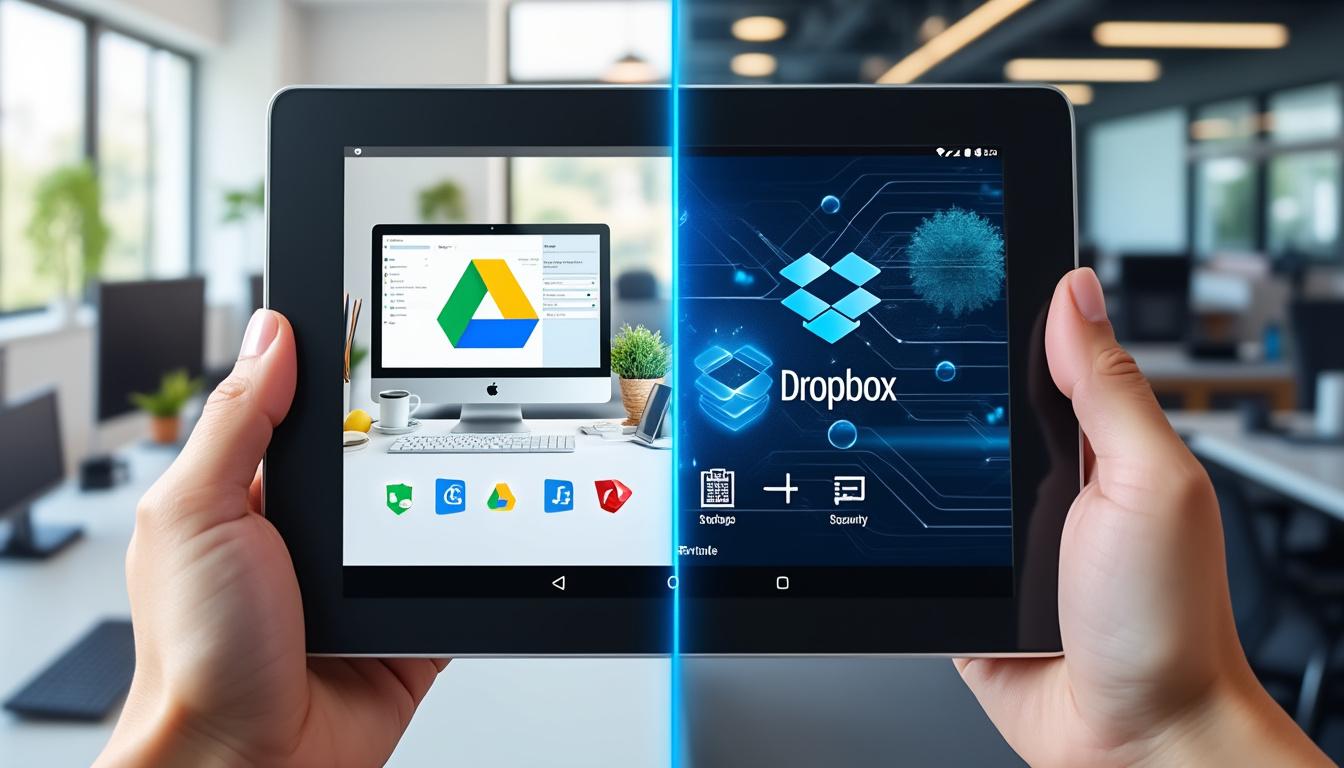In the digital age where data accumulates at lightning speed, choosing a reliable cloud storage solution has become crucial for both businesses and individuals. Two of the most emblematic players in this market are Google Drive And Dropbox, each offering attractive features but also presenting certain specificities that may influence your choice. To help you determine which service best suits your needs, this article provides a detailed comparison between Google Drive, Dropbox Plus, and Dropbox Business. By looking at key criteria like value for money, security, ease of use and more, we aim to provide you with an overview that will allow you to make an informed decision.
Summary comparison table of services
| Features | Google Drive | Dropbox Plus | Dropbox Business |
|---|---|---|---|
| Initial Cost | Free (15 GB), then from €1.99/month | From €11.99/month for 2 TB | From €15/user/month, unlimited storage |
| Free storage capacity | 15 GB | 2 GB | Not applicable |
| Security (encryption) | Yes, with two-factor authentication | Yes, with strong encryption | Yes, with advanced security options |
| Integration with other services | Excellent, especially with Google Workspace | Good, with third-party integrations | Excellent, with enterprise integrations |
| Real-time collaboration | Yes, with Google Docs | Yes, thanks to Dropbox Paper | Yes, with advanced features |
Cloud Storage Service Comparison Criteria
To carry out this comparison, we have chosen several essential criteria in order to evaluate cloud storage solutions comprehensively. Let’s see in detail how Google Drive And Dropbox differ on these different points.
Value for money
One of the first considerations before choosing a storage solution is usually its value for money. Users should evaluate how much storage space they get for the price they pay. Google Drive, for example, stands out for its initial generosity, offering 15 GB of free storage, which is significantly higher than the 2 GB offered by Dropbox. However, Dropbox’s paid options offer considerable space at competitive rates, especially for users with significant storage needs.Google Drive: Subscriptions via Google One are available starting at €1.99/month for 100 GB. Dropbox Plus:
- Starting at €11.99/month, you get 2 TB. Dropbox Business:
- Prices starting at €15/user with unlimited storage. Data Security
- Security is a significant factor when choosing a storage solution. While both services offer encryption that protects your files, Dropbox
is often considered to have a slight edge thanks to its advanced security features. These tools include two-factor authentication and options to protect shared files with passwords. Meanwhile,
Google Drive also uses high-level encryption, but its data privacy concerns may raise questions for some users. Ease of Use Ease of use is paramount, especially for enterprise teams that need to quickly move between tasks. Dropbox
is often cited for its user-friendly interface and intuitive navigation, while
Google Drive is highly integrated into the Google ecosystem, making it easy to use for those already familiar with tools like Google Docs and Sheets. Each service has a unique lightweight feel, but some users may find Google Drive Slightly more complex to navigate due to its nested folder system. Detailed analysis of each storage solution Google Drive Google Drive
positions itself as a versatile solution for those looking for storage integrated with other Google services. It not only offers large storage capacity, but also enables real-time collaboration via tools such as Google Docs and Sheets. This makes it ideal for teams already using these tools.
Strengths:
Exceptional integration with Google Workspace for seamless collaboration. 15 GB of free storage that can be shared across multiple Google services.
- Powerful integrated search functionality thanks to Google’s advanced capabilities.
- Exceptional integration with Google Workspace for seamless collaboration.
- 15 GB of free storage that can be shared across multiple Google services.
- Powerful integrated search functionality thanks to Google’s advanced capabilities.
- Weaknesses:
- Security issues related to the use of data for ad targeting.
- File organization sometimes considered less intuitive.
- Variable upload speeds, which can be problematic during heavy usage.
- Security concerns related to the use of data for ad targeting.
- File organization sometimes considered less intuitive.
- Variable upload speeds, which can be problematic during heavy usage.
- Who it’s best for:
- Ideal for users and small teams who are already integrated into the Google ecosystem.
- Dropbox Plus
- Dropbox Plus is suitable for individual users or small businesses with less extensive storage needs. It prioritizes file sharing and collaboration, making it ideal for content creation teams. Strengths:
Excellent file sharing feature with advanced options like setting passwords.
Generally fast file sync speeds thanks to its bulk file upload method. Simple and intuitive user interface, making navigation easy.
- Excellent file sharing feature with advanced options like setting passwords.
- Generally fast file sync speeds thanks to its bulk file upload method.
- Simple and intuitive user interface, making navigation easy.
- Cons:
- Very limited free plan compared to Google Drive.
- Less integration with other third-party services, which could reduce its usefulness.
- Very limited free plan compared to Google Drive.
- Less integration with other third-party services, which could reduce its usefulness.
- Who it’s best for:
- Content creators or project teams who frequently share large files.
- Dropbox Business
- The
- Dropbox Business version is designed for businesses looking to manage large amounts of data. With unlimited storage and advanced security features, it’s often the preferred choice for organizations requiring increased confidence in their storage systems.
Pros:
Plenty of storage space to accommodate business growth. Advanced collaboration tools for teamwork. Robust security options to protect sensitive data.
- Plenty of storage space to accommodate business growth.
- Advanced collaboration tools for teamwork.
- Robust security options to protect sensitive data.
- Cons:
- Cost per user can be a barrier for small businesses.
- Not as user-friendly for users who aren’t already familiar with Dropbox.
- Cost per user can be a barrier for small businesses.
- Not as user-friendly for users who aren’t already familiar with Dropbox.
- Who it’s best for:
- Large businesses with high storage needs and requiring increased levels of security.
- Which is the best choice for you?
- The choice between
- Google Drive ,
Dropbox Plus
, and Dropbox Businessshould be guided by your specific needs. For freelancers or solo professionals, Google Drivecan be very attractive thanks to its free storage and integration with other services. However, if you often work with large files and need a smooth interface for sharing, Dropbox is generally recommended. Are you a freelancer? Choose Google Drive for its free storage and integration. Are you a small business? Opt for Dropbox Plus for its convenient sharing features.
- Are you a large business? Dropbox Business is an excellent option for centralized and secure management. Choosing a cloud storage solution is a crucial decision that can impact your team’s productivity. Weighing the pros and cons of each service will help you find the one that best aligns with your expectations and workflows.




